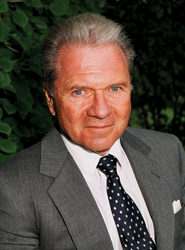The drive towards faster trading speeds may be hitting a wall.
In the wake of the May 6 "Flash Crash," the Securities and Exchange Commission, academics, and industry professionals are swapping ideas about capping trading speeds at some level. If any of the ideas are translated into regulatory initiatives, the repercussions would likely be significant.

"Trading happening at one millisecond or faster isn’t the purpose of the stock market," Michael Goldstein, a professor at Babson College who took part in a SEC roundtable last month, told Traders Magazine. "It’s to allocate capital, and I believe it hasn’t been doing that any better than in 2007, when markets were slower."
In 2007, Regulation NMS went into effect and unleashed a torrent of high-speed trading in stocks listed on the New York Stock Exchange. Since then, so-called high frequency traders have come to dominate stock trading, driving the industry to reduce the latency of its infrastructure.
The activities of high frequency traders and the dramatic increase in trades done within one second have been blamed for destabilizing the market and putting long-term investors at a disadvantage.
Some consider the events of May 6–when the market plunged by 7 percent in less than 20 minutes and then roared back–as sign of a market drunk on speed.
Now comes the pushback. The SEC is mulling three ideas to rein in the speed of trading. First, it could mandate a floor of some sort on the overall movement of data. Second, it could require the batching of trades at exchanges, allowing them to execute only at minimum intervals. Third, it could mandate a minimum time that quotes must remain accessible.
An overall floor, or speed limit, has Goldstein’s endorsement as well as others’. Jeff Donovan, a partner at Nanex, a provider of market data feeds, who has been critical of the performance of the exchanges on May 6, suggests a limit of 50 milliseconds.
"It’s getting to the point where it’s not funny anymore," Donovan says. "If most of those quotes the high-frequency traders are spitting out are meaningless or an exchange is doing it to say they are providing liquidity. A limit would level the playing field and eliminate a lot of the garbage we see going on without really affecting any legitimate trades."
While others contend speed limits would be difficult to implement and enforce, batching and the concept of a "minimum quote life" are being taken seriously.
Batching would effectively transform the stock market into a series of mini call auctions, whereby traders meet every second or so to transact. The SEC first broached the idea in January in its Concept Release exploring market structure.
Batching has at least one industry proponent. Thomas Peterffy, chairman and chief executive of Interactive Brokers, which operates the Timber Hill market making unit, has petitioned the SEC to batch all trades for 100 milliseconds except for those of registered market makers.
He told regulators last month at a public meeting run by the SEC and the Commodity Futures Trading Commission that the marketplace needed more committed market makers.

"High frequency traders should be encouraged to become bona fide regulated market makers," Peterffy told the regulators. "This could be achieved if all orders, modifications and cancellations sent to any trading center were buffered for 100 milliseconds before being sent to the matching engine except when sent by a market maker."
Opponents of batching say such a move could make it more difficult to fill large orders. Routing strategies would become needlessly complex.
"It would be a radical change," says one brokerage executive in charge of electronic trading. He notes that the set-up would cause him to miss fills on exchanges as potential counter-parties cancel their orders and orders in reserve only pop up once every second. The situation would force him to wait another second to re-probe the exchange.
Requiring exchanges to keep any quotes they publish "live" for some period of time appeals to traders upset with quote flickering and constant fading.
Chris Nagy, managing director, order routing, sales and strategy, at TD Ameritrade, told the SEC in a letter that retail investors expect to be able to trade at the prices they see on their computers and "do not accept the excuse that the quote they saw is not attainable." The exec petitioned the SEC to make quotes effective for a minimum amount of time.
The SEC is taking the request seriously. SEC commissioner Elisse Walter broached the topic at the June market structure roundtable. Sal Arnuk, a partner at Themis Trading, told Walter that vanishing quotes bedeviled him almost daily. "You need to have confidence that the quote you see on the screen is accessible," Arnuk said. "The quality of quotes is tied to speed."
Needless to say, high-frequency market makers don’t like the idea. Steven Schuler, chief executive officer at Getco, appearing at the same meeting, told the regulators:
"It’s a slippery slope if you regulate how long someone has to hold their quotes," he told Walter. "It would be a big mistake to slow everything down to the lowest common denominator. We would not have the most competitive markets in the world if we did."
Manoj Narang of Tradeworx, another high-frequency market maker, notes any time-in-force rule for quotes would widen spreads.
"Every time the e-Mini futures contract ticks up in value, a trader will be able to lock in a riskless payoff by shorting the futures and lifting the frozen offer on SPY," Narang said in an e-mail. "Similar arbs will arise in highly but imperfectly related stocks, and between stocks vs options. In order to avoid getting picked off, market-makers will have no choice but to widen out their spreads."
Nevertheless, as trading moves into nanoseconds, or billionths of a second, some believe the drive for speed has gone too far.
"There are few events in life requiring decision making which can be altered in less than a blink of the eye," Jeff Engelberg, a trader with Southeastern Asset Management, told the SEC in June. "We do not feel that securities trading falls into that category. We ask whether speed has reached an inflexion point and become a liability to the markets."



